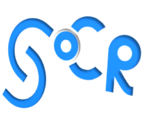Difference between revisions of "SOCR Intro UMich 2018"
(Created page with "== SOCR News & Events: Introduction to the Statistics Online Computational Resource (SOCR) == ==Logistics== Image:SOCR_Logo_April_2018.png|150px|thumbnail|r...") |
(No difference)
|
Revision as of 10:04, 23 April 2018
Contents
SOCR News & Events: Introduction to the Statistics Online Computational Resource (SOCR)
Logistics
- Event: 2018 Global Sexual Health Summer Institute
- Series: Big Data & Health Analytics
- Session: Big Healthcare Data: Research Challenges, AI Capabilities, and Educational Opportunities
- Place/Time: TBD
- Instructor: Ivo D Dinov
Abstract
This session will focus on three Big Healthcare Data topics (1) healthcare challenges, (2) analytical capabilities, and (3) educational opportunities. Participants are encouraged to bring their laptops to experiment with some of the interactive content and hands-on demonstrations. JavaScript- and Java-enabled web-browsers would be useful. Participants interested in diving deeper into health analytics should also install R and RStudio graphical user interface. The unique URI for this session is http://myumi.ch/6xNgd and it contains links to all resources that will be demonstrated.
Desired learning outcomes
- Understand the nature of Big Biomedical and Health data archives (challenges, strategies and pitfalls)
- Gain access to biomedical and health data, analytical protocols, software tools, and learning modules
- Experiment with some of the available software and computational services
- Compare and contrast advanced statistical concepts, grasp model assumptions/limitations and apply them for quantitative analyses in healthcare research.
Coverage
As time permits, we will cover some of the topics listed below.
Motivation
We will begin by examining several Big Biomedical case-studies (AD, PD, ALS). Then, we will try hands-on some complex visualization of neurodegenerative imaging, clinical and genetics data. The key point will be to identify the common characteristics of Big (Biomedical and Health) Data and define predictive analytics.
Simplifying Complex High-dimensional Data
We will demonstrate examples of interrogating multisource, multidimensional and heterogeneous datasets.
Model-based vs. Model-free Analytical Methods
- Association Rules Machine-Learning, Head and Neck Cancer Medications Case-Study
- Divorce and Consequences on Young Adults Case-Study
- Unsupervised Clustering, Pediatric Trauma Case-Study.
Learning Modules and Instructional Resources
SOCR Tools
The Statistics Online Computational Resource (SOCR) provides tools and services for capturing and interrogating biomedical and healthcare data. These include SOCR Analytical Toolkit (SOCRAT), SOCR Data Dashboard Webapp, SOCR PubMed Navigator, Motion Charts, Randomization, Resampling and Simulation Webapp Violin Chart, Interactive (3D) Bivariate Normal Distribution Calculator webapp, Normal Distribution Calculator, Distributome Probability Calculators, Virtual Experiments, Simulators, Probability Distributome Navigator, Econometrics Webapps, XTK/HTML5 Brain Viewer and BrainBook Painter, DataSifter: Sharing and Obfuscation of Sensitive Data, CBDA: Compressive Big Data Analytics, 2D Interactive Voronoi Tessellation App, SOCR t-SNE Dimensionaltiy Reduction (TensorBoard) UKBB Machine Learning Modules, SOCR GitHub Resources, Apps, Code, Tools, and other Services.
References
- URL: http://wiki.socr.umich.edu/index.php/SOCR_News_2018_UMSN_SummerInstitute
- Dinov, ID, 2018. Data Science and Predictive Analytics: Biomedical and Health Applications using R, Springer, Computer Science, ISBN 978-3-319-72346-4.
- Data Science and Predictive Analytics (DSPA) Website: http://predictive.space
- Publications
- SOCR Home page: http://www.socr.umich.edu
Translate this page:
